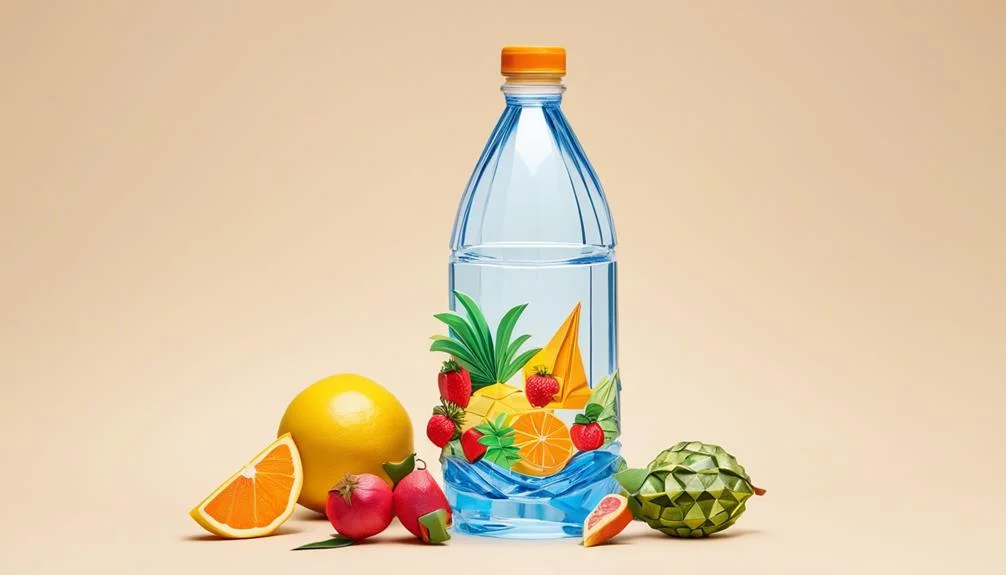The pros of Fiji water are its rich mineral profile, which aids bone health and nerve transmission, and a balanced pH of 7.7. It is also valued for its distinct, refreshing taste, its sustainable packaging initiatives, and the convenient resealable design of its bottles.
The cons of Fiji water are concerns relating to its water quality, with studies revealing high bacterial levels. Another drawback is its high cost when compared with other water alternatives, and it is often perceived as an unnecessary luxury due to limited and specific availability.
Takeaways:
- Fiji Water is known for its purity and taste due to its unique filtration process through volcanic rock layers.
- The water contains essential minerals such as sodium, magnesium, potassium, and calcium, which can support hydration, overall health, and weight management.
- The high silica content in Fiji Water promotes skin and bone health and can have positive effects on blood circulation and skin appearance.
- Fiji Water demonstrates a commitment to sustainability through its use of 100% recycled plastic bottles and support for local Fijian communities.
| Pros of Fiji Water | Cons of Fiji Water |
|---|---|
| Natural Purity and Taste | Environmental Impact of Water Extraction |
| Environmental Responsibility Initiatives | High Carbon Footprint from Transportation |
| Health Conscious Product | Plastic Waste Concerns |
| Convenience in Consumption | Criticism of Business Model |
| Premium Brand Image | Involvement in Scandals |
| Resealable Bottle Design | Concerns Over Water Quality |
| Sustainable Packaging Efforts | Limited Access to Clean Water in Fiji |
| Global Availability | High Cost Compared to Alternatives |
| Distinctive Packaging | Perceived as Unnecessary Luxury |
| Brand Recognition and Trust | Dependence on Single Source |
Pros of Fiji Water
- Natural Purity and Taste: Fiji Water is sourced from an underground aquifer in Fiji, ensuring its natural purity and freshness. This natural filtration process contributes to a clean and crisp taste that is often praised by consumers. Unlike many other bottled waters, Fiji Water’s distinct taste is a direct result of its unique source, offering a premium drinking experience.
- Environmental Responsibility Initiatives: The company shows commitment to environmental responsibility by using renewable energy in its bottling facility and funding various conservation projects. These efforts demonstrate Fiji Water’s dedication to sustainability and its role in promoting environmental stewardship. The move towards renewable energy sources helps in reducing the carbon footprint of the production process.
- Health Conscious Product: Fiji Water provides essential hydration without any added sugars or calories, making it a healthy choice for consumers. This aspect is particularly important in a market where health-conscious decisions are increasingly valued. Fiji Water’s purity ensures that it is free from contaminants and additives, aligning with a healthy lifestyle.
- Convenience in Consumption: The availability of Fiji Water in various sizes makes it a convenient option for on-the-go consumption. Whether it’s a small bottle for a quick drink or a larger one for extended hydration needs, Fiji Water caters to diverse consumer requirements. The convenience factor is enhanced by its wide availability in many stores and vending machines.
- Premium Brand Image: Fiji Water has successfully positioned itself as a premium brand in the bottled water market. This image is supported by its unique source, packaging design, and marketing strategies. The premium branding appeals to consumers who are willing to pay extra for perceived higher quality and status associated with the product.
- Resealable Bottle Design: The resealable caps on Fiji Water bottles are a practical feature that reduces spills and allows for easy consumption. This design aspect is especially beneficial for consumers who are on the move, as it enhances the product’s usability and convenience. The resealable nature also helps in maintaining the water’s freshness over time.
- Sustainable Packaging Efforts: Fiji Water’s transition to 100% recycled plastic bottles for some of its products is a significant step towards sustainable packaging. This initiative reduces the environmental impact of plastic waste and showcases the company’s commitment to eco-friendly practices. The use of recycled materials in packaging is a positive move towards sustainability in the industry.
- Global Availability: Fiji Water is widely available in many countries, making it accessible to a broad customer base. Its global distribution network ensures that consumers can enjoy Fiji Water regardless of their location. This wide availability has contributed to the brand’s popularity and growth in the international market.
- Distinctive Packaging: The unique square shape and design of Fiji Water bottles make them easily recognizable and aesthetically appealing. This distinctive packaging not only differentiates Fiji Water from other brands but also adds to the overall consumer experience. The attractive design is often associated with luxury and exclusivity, enhancing its appeal as a premium product.
- Brand Recognition and Trust: Over the years, Fiji Water has built significant brand recognition and trust among consumers. This reputation is a result of consistent product quality, effective marketing, and celebrity endorsements. The high level of trust and recognition contributes to customer loyalty and preference for Fiji Water over other brands.
Cons of Fiji Water
- Environmental Impact of Water Extraction: The extraction of water from Fiji for global distribution has been criticized for its environmental impact. This process can potentially strain local water resources and disrupt natural water cycles in Fiji. The environmental implications of water extraction raise concerns about the sustainability of the source and the long-term effects on the local ecosystem.
- High Carbon Footprint from Transportation: Transporting Fiji Water thousands of miles across the world contributes significantly to its carbon footprint. The emissions from shipping the product globally are a concern for environmentally conscious consumers. This aspect of Fiji Water’s business model conflicts with growing awareness and efforts to reduce carbon emissions.
- Plastic Waste Concerns: Despite efforts in sustainable packaging, Fiji Water still contributes to plastic waste, a major environmental issue. The use of plastic bottles, even if partially recycled, adds to the global problem of plastic pollution. This is a critical concern for consumers and activists who prioritize reducing plastic waste in the environment.
- Criticism of Business Model: Fiji Water’s business model, particularly its shipping and logistics practices, has faced criticism for its environmental impact. The long-distance transportation of bottled water is seen as inefficient and environmentally harmful compared to local water sources. This criticism highlights the paradox of shipping water from a remote location while local communities may lack access to clean drinking water.
- Involvement in Scandals: Fiji Water has been involved in various scandals, including accusations of shady business decisions and political maneuvering. These controversies have tarnished the brand’s image and raised ethical concerns among consumers. The company’s history of scandals can lead to consumer mistrust and negative perceptions.
- Concerns Over Water Quality: A study by the University of Vermont found high levels of bacteria in Fiji Water, raising concerns over its quality. This contradicts the brand’s image of purity and poses health risks to consumers. Quality concerns can lead to a loss of consumer confidence and damage the brand’s reputation for offering pure and safe drinking water.
- Limited Access to Clean Water in Fiji: Despite being a major exporter of bottled water, 12% of Fiji’s inhabitants do not have access to clean drinking water. This situation highlights a stark contrast between the exported luxury product and the local community’s needs. The disparity raises ethical questions about resource allocation and corporate responsibility.
- High Cost Compared to Alternatives: Fiji Water is priced higher than many of its competitors, making it a less affordable option for everyday consumption. The premium pricing can be a barrier for budget-conscious consumers who may opt for more cost-effective alternatives. This pricing strategy limits the brand’s appeal to a niche market of affluent consumers.
- Perceived as Unnecessary Luxury: Some consumers view Fiji Water as an unnecessary luxury, given the availability of cheaper or sustainable alternatives like tap water or home filtration systems. This perception can limit the brand’s market reach, especially among environmentally and cost-conscious individuals. The luxury image might not align with the growing trend of sustainability in consumer choices.
- Dependence on Single Source: Relying on a single source in Fiji for water extraction can be risky due to potential natural disasters, political instability, or resource depletion. This dependence makes Fiji Water vulnerable to supply disruptions and challenges in maintaining consistent product quality. Diversification of water sources could mitigate these risks, but it might also affect the brand’s unique selling proposition.
Understanding Fiji Water
Fiji Water originates from the pristine Yaqara Valley of Viti Levu, one of the islands of Fiji, offering consumers a taste of its uniquely filtered rainwater enriched with minerals from volcanic rock. This remote location in the South Pacific Ocean contributes to the water’s purity and its reputation for high quality. As rainwater filters through layers of volcanic rock, it naturally acquires essential minerals such as sodium, magnesium, potassium, and calcium, which are beneficial to health and contribute to Fiji Water’s distinctive soft, smooth taste.
The company prides itself on environmental responsibility, using bottles made from 100% recycled plastic and engaging in initiatives that support local Fijian communities through infrastructure development. However, despite these efforts, there remains some criticism regarding the broader environmental implications of shipping bottled water internationally, which adds to the product’s carbon footprint. Furthermore, the premium price of Fiji Water places it at a higher cost point compared to other bottled water brands, a factor that may affect consumer choice.
Nonetheless, the brand maintains a loyal following who appreciate the water’s taste and purported health benefits.
Health Benefits Explored

While the environmental and economic aspects of Fiji Water are subject to debate, its health benefits, attributed to a unique mineral composition, present a compelling aspect for consumers.
Fiji Water is known for its essential electrolytes, such as sodium, potassium, magnesium, and calcium, which are vital for proper hydration and overall health. The low sodium content is particularly beneficial for individuals who need to manage their salt intake, while its calorie-free nature supports weight management efforts.
The silica content in Fiji Water is noteworthy; it plays a significant role in promoting skin and bone health. Silica is integral to the production of collagen, which enhances skin elasticity, and it also contributes to bone tissue formation and maintenance, which can reduce the risk of bone-related injuries. Additionally, its higher pH level and natural electrolytes are suggested to have positive effects on blood circulation and skin appearance.
Key health benefits of Fiji Water include:
- Enhanced hydration and support for overall health due to essential electrolytes.
- Promotes skin and bone health through its high silica content.
- Low in sodium and calorie-free, aiding in weight management and suitable for those on low-salt diets.
Nutritional Content Breakdown
Turning our attention to the nutritional content of Fiji Water, it is notable for its unique mineral composition. The presence of minerals like magnesium and potassium enhances the water’s potential health benefits, while its absence of calories and sugar makes it a pure hydration option.
Analysis of its mineral content, particularly silica, suggests additional advantages for consumers’ physical well-being.
Mineral Composition Analysis
Analyzing the mineral composition of Fiji Water reveals a beneficial blend of essential nutrients, including magnesium, potassium, calcium, and silica, which play pivotal roles in maintaining various physiological functions. Each liter of Fiji Water contains 14.7 milligrams of magnesium, 4.9 milligrams of potassium, 17.9 milligrams of calcium, and 93.4 milligrams of silica.
These minerals are vital for overall health and contribute to Fiji Water’s reputation as a premium bottled water choice.
- Magnesium: Supports muscle and nerve functions, and energy production.
- Calcium: Essential for bone strength and cardiovascular health.
- Silica: Promotes healthy skin, hair, and nails, and is known for its potential to support joint health.
Caloric and Sugar Content
Fiji Water, acclaimed for its mineral-rich profile, also offers considerable nutritional advantages as a zero-calorie and sugar-free hydration option. It caters to health-conscious individuals and those managing their dietary intake meticulously. With one liter providing 0 grams of fat, carbohydrates, and protein, it stands as an ideal choice for a low-calorie diet.
The presence of essential minerals like magnesium, potassium, calcium, and silica adds to its appeal. Specifically, every liter contains 14.7 milligrams of magnesium, 4.9 milligrams of potassium, 17.9 milligrams of calcium, and a notable 93.4 milligrams of silica.
Such a composition not only supports adequate hydration but may also contribute to improved bone health, showcasing Fiji Water as a beneficial addition to a well-rounded diet.
Environmental Impact Assessment

Environmental Impact Assessments (EIA) serve as a critical tool in gauging the potential ecological ramifications of bottling operations like those conducted by Fiji Water. These assessments meticulously examine how the extraction and bottling processes affect the environment, focusing on safeguarding the air, water, and soil quality, as well as preserving the well-being of local communities and ecosystems.
The EIA process is multifaceted and includes:
- Identifying the breadth of potential environmental effects linked to Fiji Water’s operations, from resource extraction to the manufacturing of plastic bottles.
- Integrating scientific and public scrutiny to ensure that environmental and social concerns are adequately addressed.
- Formulating a strategic approach to mitigate adverse impacts, improve environmental performance, and promote sustainability in all facets of the operation.
The EIA’s findings are instrumental in the decision-making process, aiming to balance economic and environmental interests. It helps Fiji Water to adopt practices that are not only beneficial to the company but also responsible towards the environment and society.
Through this process, Fiji Water has the opportunity to demonstrate environmental stewardship and gain public trust by minimizing its ecological footprint and contributing to sustainable development.
Comparing Bottled Water Brands
When examining the bottled water market, it is essential to consider both the environmental impact and the taste profile of each brand.
Fiji Water, for instance, is often contrasted with brands like Evian and Dasani, which also have distinct mineral contents and flavor nuances.
Additionally, the sustainability practices of these companies, from sourcing to packaging, play a significant role in consumer choice and industry comparison.
Brand Environmental Impact
Assessing the ecological footprint of bottled water brands, Fiji Water demonstrates a commitment to sustainability through measures such as bottling at the source to reduce emissions and using 100% recycled plastic for their bottles. The company’s initiatives reflect a growing industry awareness of environmental responsibility. Despite the inherent challenges of the bottled water industry in terms of sustainability, Fiji Water’s efforts signal a positive direction.
- Minimized Transportation Emissions: Bottling at the source significantly reduces the carbon footprint associated with transporting water.
- Carbon Footprint Reduction: Commitment to sustainability includes investment in renewable energy and carbon offset projects.
- Community Collaboration: Working with local communities ensures the protection and sustainable management of water sources, creating a shared environmental stewardship.
Taste Profile Differences
Fiji Water distinguishes itself from other bottled brands with a unique taste profile, often attributed to its mineral-rich composition and filtration through volcanic rock. This natural artesian water system contributes to a taste that many find superior in side-by-side comparisons with brands like Evian Water. In terms of mineral content, Fiji Water’s higher mineralization offers a flavor that some consumers prefer, believing it enhances the water’s mouthfeel and overall satisfaction.
Moreover, the slight difference in pH levels, with Fiji at 6.96 and Evian at 7.07, could influence the perception of taste, giving Fiji Water a subtly different character. Consistently, taste tests indicate that Fiji Water’s purity and distinctive taste set it apart, making it a popular choice among discerning bottled water enthusiasts.
Packaging and Sustainability Issues

Despite efforts to promote sustainability by using 100% recycled plastic for their bottles, Fiji Water faces criticism for its environmental impact due to the inherent issues with plastic waste and the carbon emissions associated with product transportation. The decision to use recycled plastic is a step towards environmental responsibility, but it does not address the larger problem of plastic pollution as a whole. Plastic can only be recycled a finite number of times before it degrades in quality and becomes waste. Additionally, transporting water from Fiji to global markets involves long-distance shipping, which contributes to greenhouse gas emissions and climate change.
Key points to consider include:
- Plastic Pollution: Even if bottles are made from recycled plastic, they can still contribute to environmental pollution if not properly disposed of or if they end up in natural habitats.
- Carbon Footprint: The energy-intensive process of transporting bottled water across vast distances significantly increases the product’s overall carbon emissions.
- Recycling Challenges: Recycling infrastructure varies by region, and not all recycled bottles end up being reused, further complicating the sustainability narrative.
While Fiji Water has made some strides in sustainability, these efforts are juxtaposed against the backdrop of an industry that is inherently resource-intensive and environmentally challenging.
Economic and Social Considerations

Contributing significantly to the local economy, Fiji Water provides employment for approximately 400 Fijians and engages in various community development initiatives. By doing so, the company not only offers direct economic benefits through job creation but also contributes to the Fijian economy through taxes and investments in infrastructure. This support extends to social responsibility efforts, where Fiji Water backs education and healthcare projects, aiming to foster improved living conditions and sustainable development within the local communities.
Nevertheless, environmental concerns arise from the brand’s operations, primarily due to the long-distance transportation of its products and the utilization of plastic bottles. These practices contribute to a considerable carbon footprint and exacerbate the global plastic waste issue. In response, Fiji Water has put forth sustainability measures to mitigate these environmental impacts, focusing on carbon footprint reduction and more responsible waste management.
The company’s local impact, however, is a mixed narrative. While it does create employment opportunities and invests in the community, there have been issues surrounding the equitable distribution of benefits to the local populace. Disputes with the Fijian government regarding taxes and royalties have also surfaced, highlighting the complexities of balancing corporate success with fair contributions to the host country’s welfare.
Conclusion
In conclusion, Fiji Water emerges as a beacon of purity in the bottled water industry, its untainted essence flowing from a secluded aquifer.
However, the environmental toll and societal implications cast a shadow upon this liquid luxury.
Striving for balance, consumers must weigh the pristine taste and health benefits against the ecological footprint and ethical considerations.
The choice, akin to a double-edged sword, demands careful deliberation on the impact of indulging in this premium hydration experience.